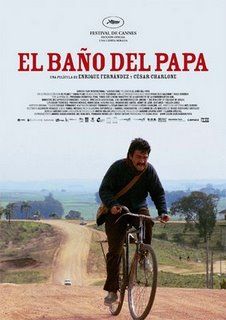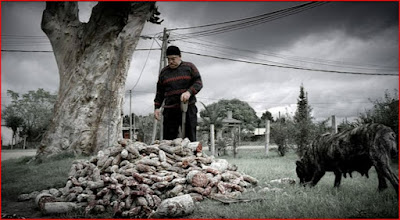 I couldn't resist the title when it leered out at me from an Albany Public Library shelf, but this collaboration by writer-directors Cesar Charlone and Enrique Fernandez, though often funny, isn't nearly as sacrilegious as one might want. The Pope is the long-lived but unimaginatively-named John Paul (or Juan Pablo for our protagonists) II, but the toilet isn't meant for him to leave relics in. The setting is Melo, a Uruguayan town near the border with Brazil. One of the few booming business sectors there is smuggling consumer goods by bicycle across the border, presumably to avoid import duties, and selling them to local stores. There are many small-time operators, most operating on simple pedal power, a lucky few with motorbikes. It's a risky vocation. If you try to cross at the official border crossing, you may have to deal with the military. Try to cut through farmland or pasturage and you have to deal with the customs police. It's not clear which is worse, but Meleyo, the local customs cop, is corrupt. In practice, that means he'll take your stuff and keep it or sell it himself. It also means you might be able to do business with him.
I couldn't resist the title when it leered out at me from an Albany Public Library shelf, but this collaboration by writer-directors Cesar Charlone and Enrique Fernandez, though often funny, isn't nearly as sacrilegious as one might want. The Pope is the long-lived but unimaginatively-named John Paul (or Juan Pablo for our protagonists) II, but the toilet isn't meant for him to leave relics in. The setting is Melo, a Uruguayan town near the border with Brazil. One of the few booming business sectors there is smuggling consumer goods by bicycle across the border, presumably to avoid import duties, and selling them to local stores. There are many small-time operators, most operating on simple pedal power, a lucky few with motorbikes. It's a risky vocation. If you try to cross at the official border crossing, you may have to deal with the military. Try to cut through farmland or pasturage and you have to deal with the customs police. It's not clear which is worse, but Meleyo, the local customs cop, is corrupt. In practice, that means he'll take your stuff and keep it or sell it himself. It also means you might be able to do business with him.Beto, our protagonist, is one of the humble pedal-power smugglers, a little smarter than the others, knowing to hide behind a big rock when Meleyo descends on the others, but not exactly the brightest star in the sky either. He's a poor man in a poor town. He has to use an outhouse at the house he shares with his wife Carmen and his daughter Silvia. He dreams of getting a motorbike to make his smuggling errands easier, while Silvia dreams of being a radio announcer. Her dreams are stoked by the Uruguayan media descending on Melo in the year of our story, 1988, to report on an impending visit and speech by the Pope during a South American tour. The Papal pilgrimage is a potential bonanza for the whole town. At a minimum, 20,000 people are expected to come to hear His Holiness. Everybody seems to be looking for a way to exploit the expected tourists. People are going into debt, taking out second mortgages, etc., to buy supplies to make cakes, chorizo sausages, etc., to sell to the hungry crowds. Beto has an even better brainstorm. With all these people noshing in the name of God, isn't there likely to be a demand no one's thought of meeting yet? That's where our titular toilet comes in. Beto intends to build a pay toilet for the tourists. He could well make enough to afford his motorbike, but he needs money up front for the toilet and building supplies. Never mind plumbing; he and his family can take care of changing the water and so forth. Still, it's going to be expensive, and some recent screwups have made many people reluctant to stake him for smuggling trips. He may have to tap into his wife's savings, which are meant to pay for Silvia's college education, and he may have to cut a deal with the devious Meleyo, the persecutor of his friends, with no guarantee that the customs cop can be trusted....
Beto is an Uruguayan Ralph Kramden, albeit in better shape thanks to the bicycle, and The Pope's Toilet is a classic get-rich-quick scheme narrative in a fresh setting. It's also an amusing but not overstated social satire in which everyone thinks of a visit by the unwordly pontiff as a chance to strike it rich. Carmen is just as much an Alice analogue, often scathing in her criticism, sometimes treated more roughly than Alice Kramden ever was, but just as worldly wise and just as devoted to her man. There's a "Baby, you're the greatest" moment when, with Beto's dream dashed because she shamed him into refusing to accept Meleyo's money, she wordlessly puts her jar full of savings on the kitchen table so Beto can make a last-minute run across the border to buy a toilet and race back in time for the Pope's arrival. Beto's run provides the dramatic climax as Meleyo catches up to him, having intended to pay him after all, only to take umbrage when Beto definitively refuses his money. In his petty wrath he does the one thing customs cops supposedly can't do: he confiscates Beto's bicycle, forcing our hero to lug the toilet the last miles back to Melo on foot, in what might be seen as the most sincere pilgrimage of this supposedly special day.
While I began to anticipate how the story would turn out, I imagine that Uruguayan audiences watched the whole film in a different way if they remembered the Pope's visit to Melo. From the standpoint of the cottage tourist industry that sprung up there, it was a fiasco. Instead of the estimated 20,000 or the hoped-for 100,000, the film tells us that only 8,000 people attended the papal speech. There's a poignant montage of all the leftover food from all the stalls that ends up dumped for dogs and pigs to eat, followed by a hint that Beto may have made a better investment in the long term. Meanwhile, the TV reports as if the papal visit had been a triumph for Uruguay. As a host urges the Pope to come back soon, Beto throws a drink at the barroom TV set.
As represented by The Pope's Toilet, Melo is a modest but gratifying stop on my itinerary around the wild world of cinema. The film features a striking combination of realistic grunginess and vivid cinematic landscapes. The co-directors have a strong pictorial sense (Charlone did the cinematography) and an eye for following action that comes through best in the opening chase with Meleyo in his truck pursuing the bicycling smugglers. The acting is good across the board as far as I can tell from listening to the Spanish dialogue, with Cesar Trancoso as Beto naturally standing out. The film has collected a lot of awards from Latin American festivals, deservedly so in my opinion, and it comes to American DVD via Film Movement's "movie of the month club," to which the Albany library admirably subscribes. This isn't the sort of extreme experience of one kind or another that many movie bloggers seek out, but I think it would have held its own had it appeared in the golden age of international art-house cinema on big screens across America.
An Uruguayan landscape with two bicyclists (lower right) by co-director/cinematographer Cesar Charlone.
Film Movement has an English-subtitled trailer for the movie on YouTube, so here it is.






No comments:
Post a Comment